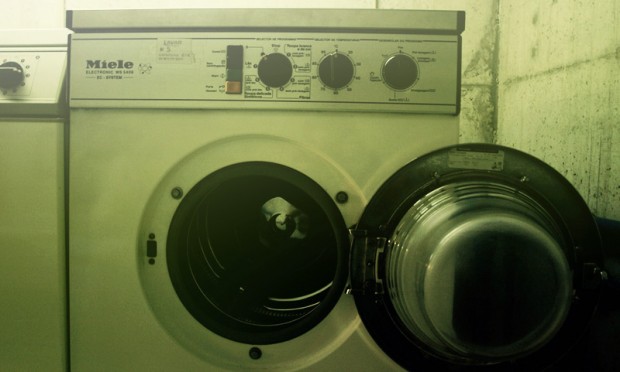You have no items in your cart. Want to get some nice things?
Go shopping
Pull and pull again, tilt forward, pivot on the corner, swing, pivot on the other corner, walk out, pull and pull again. Not as young as he once was, but after all these years what mattered was experience over energy, mind over matter.
Pete leant on the washing machine, catching his breath, looking around. It was a big kitchen. Big and empty and incomplete, caught between one age and another, one owner and the next. It was clear the new owner wanted a modern kitchen, one gutted of the past, cleared of its reminders. Ghosts of fixtures past haunted the walls; dressers, shelves and cupboards cast negative shadows across age-darkened wallpaper. The house still clung to what remained of the old, but the new owner would win; the house did not have the energy to resist such determined change. Through the window Pete could see bygone furniture and fittings in the skip on the driveway, viscera and memories of the old house.
The kitchen had been stripped to its bare essentials — a Belfast sink, a cooker of sorts and shelves in a pantry whose days against modern designs were surely numbered. The old fittings were joined by a fridge, a microwave and the washing machine, transients from the move, to be moved on without remorse when the time came.
Boxes were stacked high in two corners, their contents packed and sleeping, waiting until the dark Victorian gothic had been banished by downlighters and sheen-surfaced, right-angled units before they would venture into the kitchen to find new homes.
One box was open on the tiled floor. The essentials — a couple of pans, cutlery and plates for two, a pair of mugs, a kettle and little else — were out and in use on a worn-out sideboard moonlighting as a draining board and all-purpose surface.
In a living, lived-in house — a home — the flotsam and jetsam of everyday things would drift and wash into place, sorted and settled by habit rather than formality. Each thing and each kind of thing would belong, would have a home. But kettle, post, keys, phone charger and kitchenware were scattered without ritual or care across the sideboard, the floor and, before he had cleared it, the top of the washing machine. Unsettled. Restless.
Atop one pile of bills and flyers Pete spotted a yellow card: Pete the Plumber – The Promise of Punctual and Watertight Service. He smiled. He had been so much more impressed by his wording than Angela: “Dad, it makes you sound like a promise is as far as you’ll get — all talk, no plumbing. Anyway, printing stuff out and pushing it through doors isn’t how to get the work these days. You need to get yourself online.”
He liked the slogan — he even made sure to “promise” in his phone calls — and the cards seemed to work well enough. Here he was, after all, making good on his promise of yesterday.
Boiling crescendo and a click from the kettle returned Pete’s attention to other rituals. He was sure no one would mind him making himself a cuppa. He had found tea bags and milk; no sugar though — clearly not an essential.
Placing his mug and tool bag on the floor, he knelt down to inspect the back of the washing machine. “Ah, off balance. Bet that wobbled something out of place. Let’s take a look.” The owner had said the machine had worked for a few washes after the move, but had shaken wildly and loudly — wildly and loudly, at least, until it went dead and silent. He adjusted the feet of the machine, pulled out a spirit level and nodded, satisfied, before unscrewing the back to pull the rear panel off. Looking inside he chuckled. “That’d be it then. Those screws have worked themselves right out. Surprised those fastenings didn’t shear right off!”
He reached for his tea, but caught something out the corner of his eye, something unexpected, not there before. A boy. A boy standing in the centre of the tiled floor. He wore a traditional school uniform with shorts, a blazer and a cap. Motionless, the boy stared at Pete, the look in his eyes deeper than his eight or nine years. Pete knocked the mug, jolting tea onto the floor.
“Oh! Hello.” The startled tea within the mug slowly calmed. “Didn’t hear you come in.” He forced a smile out of his surprise. “I’m Pete, Pete the plumber.”
“Are you here to fix our washing machine?” The boy’s voice was crisp and well spoken. Pete was not sure what he had been expecting, but he was almost as surprised by the boy speaking as he had been by his silent appearance.
“Err, oh, yes. It’s quite a simple fix really, just a couple of screws need putting back in place. They must’ve come loose during the move. The drum would’ve been jumping around like a mad dog in a cage — lucky the fastenings didn’t come off completely! Must’ve made a hell of a racket, eh?”
The boy looked at Pete, at his tools, at the machine, then back at Pete. Calm and controlled on the outside. Pete could see in the boy’s eyes inside was a different story, as if sadness had been bottled, shaken and put to one side, barely held in by a stopper.
“If you want, you can watch me fix it.” Pete nodded an invitation. The boy hesitated but accepted, walking over to one side as Pete pointed into the machine. “See here and here? There should be screws holding these bits together. I’ll use new screws rather than the old ones — the thread’ll be gone and we want to be sure it doesn’t break again, don’t we?”
The boy watched Pete fish into his bag for washers and screws.
“I’m Timothy.”
“Pleased to meet you, Timothy. Just back from school?”
“Yes. We’re late. There were roadworks. And an accident. In the roadworks.”
“Roadworks and accidents.” Pete sighed and shook his head at Timothy. “There’s nothing worse than that. Nothing worse.”
Timothy nodded. Pete reached into his tool bag for pliers and another screwdriver.
“Got any brothers and sisters, Timothy?”
“No.”
“So just you and your parents in this big old house?”
“Just me and Mum.”
“Your Dad…?” The words were out before Pete could stop them.
Timothy hesitated. When words finally formed in his mouth, his eyes had already told the story. “He’s gone.”
“Oh… I’m sorry.” Pete looked back at the machine. He started fitting the rear panel back on. Screws he could find, but not the words. “I’m almost done.”
“I… I think Mum’s on the phone. She said she had a couple of calls to make because we were late. She… she should be here… in a moment.”
Pete tightened the last screw, patted the machine then pushed and walked it back into place.
He knelt down close to Timothy. “You know you and your Mum are going to be OK, right? It won’t be easy, but right now you’re the most important thing in the world to your Mum, more important than you could ever imagine. And your Mum… your Mum is going to do everything she can to make your life the best it could be. You’ll miss your Dad, you’ll miss him something rotten, and so will your Mum, but you’re going to be OK. That’s a promise.”
“How… how can you promise that?” Timothy’s fists clenched, a storm gathering at the edge of his calm. “You shouldn’t make promises you can’t keep.”
“When I lost Marjorie, my wife, my little girl was about as old as you are now. And that’s how it went. Angela was the most important thing in my world. She made life worth living. I tried to give her the best life I could, and she helped me have the best life I could. I look at you and I know you can be that person for your Mum.”
Timothy’s fists unclenched, the storm receding from his eyes. “You… you think I can be?”
“It won’t be easy. You have to promise to try hard — wherever you are, whatever you do, whoever you become — to look after your Mum. You think you can do that?”
“Yes… yes, I can. I promise.” The bottled sadness in Timothy’s eyes stirred with belief, with a tear.
“That’s a promise you can keep.” Pete smiled back at him. “Right, all done. Should work just as it did before the move. I’ll set it going on a short cycle just to check. Tell your Mum there’s nothing to pay — it’d be criminal to charge for such a simple fix! You’ve been great company, Timothy, and I know you can keep a promise like that.”
Pete turned the dial and pushed the button. The washing machine stirred to life with a gush of water and gentle anticipation.
“Timothy?” Timothy looked round. His mother was standing in the doorway, phone in hand, tears freshly wiped from her face, a look he knew too well. She tried to hide her crying, as if he would not notice, as if the absence of tears would not remind him of the absence of his father, as if the pretence would somehow dry their shared grief away.
“Mum, are you OK?”
“Oh… oh yes, Timothy. Yes.” She faltered a smile. “I’m just a little upset, that’s all… I was on the phone to someone whose father had just died. And that made me… anyway, it’s OK, it’s nothing to worry about — no one you know.” She cocked her head. “I heard voices?”
“The plumber.” Timothy turned back towards the washing machine. “He…”
“The plumber? I’m afraid he won’t be coming. I just spoke to his daughter. He passed away yesterday morning — a heart attack. It can’t have been more than an hour after I spoke to…” She frowned. Something was not quite right, not as expected. She stared at the washing machine marking time with a calm and rhythmic churn.
Timothy stared at the spilt tea on the tiles.
The two of them were alone in the kitchen, each one holding a question, each one missing a piece of a private puzzle. Timothy looked up at his mother and reached out to hold her hand — for reassurance, for life, for him and for her.

About Kevlin Henney
Kevlin Henney writes shorts and flashes and drabbles of fiction and articles and books on software development. His fiction has appeared online and on tree, including with Litro, New Scientist, Physics World, The Pygmy Giant and Kazka Press, and has been included in The Salt Anthology of New Writing 2013, Flash Me! The Sinthology, Scraps, Jawbreakers and Kissing Frankenstein & Other Stories anthologies. He lives in Bristol and online.




